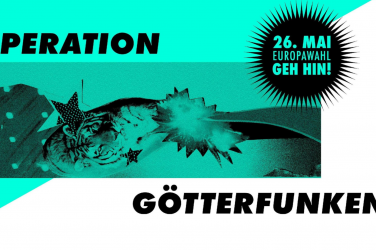Criticising Hungary for the their discriminatory law targeted at sexual minorities is more than necessary. However, Germans and Western Europeans should not forget about the problems at home when attacking Budapest, argues E&M‘s Jurek Wötzel. Otherwise, signs of solidarity such as letting the Allianz Arena shine in rainbow colours will be nothing more than a beautiful fairytale about good and evil.
Ah yes, it’s the Germans again, knowing it all, and being better than everyone else. It’s simply what we love most about ourselves, our infinite moral superiority.
In principle, the idea of letting the Allianz Arena light up in the rainbow colours on Wednesday night was a good one. It is out of question that the Hungarian LGBTQ+ community needs support after the latest infringement on their liberties by the Orban government. What was not good about it, was its subtext: moral judgment against Hungary as such.
This is what UEFA, in my view justifiably, had in mind when it forbade the city of Munich to carry out this wonderful act of bravery. UEFA defines itself as an ‘apolitical’ organisation. Now, friends of the idea that everything is political will certainly shout bullshit here, but should be reminded that this is a normative principle, not a descriptive one. UEFA, of course, is not apolitical. At large, however, it strives to act apolitically as an organisation, in other words, it aims not to take a stand when opposing political interests collide.
UEFA did not disagree with the cause, nor did they argue that showing the rainbow colours is a priori a political act. The organisation itself is committed, with limited success, to anti-discrimination principles. They deemed it a political act because of its context: the international disagreement between the more progressive European states, as Germany likes to call itself, and the more conservative, in part illiberal states. Genuinely decisive was the build-up before the Germany-Hungary match, not the Munich initiative as such. To underline this, UEFA proposed the city of Munich to display the rainbow colours on several other days of the tournament, making it less specific to the EU-Hungarian debate. Not supporting either side in this conflict is then absolutely the right decision, in spite of the problematic nature of the fact that in consequence, UEFA is essentially deciding about the correct time of queer protest. Generally, UEFA should not provide a platform for European countries to criticise each other on political scandals.
The initiative was questionable from its inception – due to its typically German lack of self-reflection
Beside UEFA’s role in this issue, the initiative was questionable from its inception – due to its typically German lack of self-reflection. When it comes to the rights of LGBTQ+ people, most European countries uphold discriminatory laws to this day. Even the now so confident Germany had not introduced same-sex marriage until 2017, which even then seemed more like a strategic move for the CDU to get re-elected. More recently, just a month before the infamous match day, Germany’s governing parties voted against a range of motions meant to expand LGBTQ+ rights, among them setting up a compensation fund for intersex and trans people. They also rejected a motion calling for the German government to put pressure on the EU Commission to secure LGBTQ+ rights in Europe. Literally a day after Bavarian president Markus Söder awkwardly posed with a rainbow-coloured mask in the Allianz Arena, the governing CDU/CSU, which he belongs to, voted against a motion aimed at easing the restrictions for gay men to donate blood. If one were to tell their child what performative justice looks like, this kind of hypocrisy can serve as the prime example.
Another layer of irony in this story is that football is a cultural sphere which probably ranks second in homophobia (right after hip hop) in Germany. When German newspapers were full of rage about right-wing extremist Hungarian fans in Munich that were shouting homophobic slurs, did they forget that homophic slurs can be heard on every single matchday of the Bundesliga? Did they forget about the fact that to this day, Thomas Hitzlsperger, a former Bundesliga player, is the only German player to have come out? In February this year, 800 German footballers launched a campaign aimed at making LGBTQ+ colleagues more comfortable about their coming out. It fizzled out. Meanwhile, Philipp Lahm, former captain of the national team and world cup winner of 2014, even warned fellow footballers to come out. They would face enormous pressure within their teams, on social media, and of course, on the pitch, watched by thousands of drunk fans with often rather problematic ideas about masculinity. All of that trouble at home had not stopped hypermotivated local politicians of the liberal party in Munich to request “sending a signal” to Budapest.
Surely, Hungary could be seen as the famous bad guy in the back of the class called EU. Nevertheless, the class as such has some serious problems. Despite Europe’s self-understanding as the world’s human rights pioneer, practically all European countries have recently committed or supported serious offenses against human rights, for instance the illegal war in Libya or the illegal pushbacks of refugees at the border. Julian Assange is still imprisoned and Edward Snowden still not granted asylum. Christ’s famous reply to a bunch of men intending to stone a woman guilty of adultery seems relevant here: “He who is free of sin shall cast the first stone”. I am positive that Germans would have a similar moral intuition if Hungary displayed a few tanks in the Puskas Arena to remind Germany to not sell the Leopard-II to Saudi-Arabia anymore. How does this immoral country dare to criticise us like this? They themselves are infringing on human rights! UEFA shouldn’t side with them!
The more progressive states have reason and the duty to defend the rights of LGBTQ+ people in Hungary against an increasingly oppressive government. Yet, there are smart ways and ignorant ways to do this.
This is not to say that EU member states should, in general, refrain from holding each other accountable for their deeds. Delegitimising criticism on the basis that the critic is not 100% correct in other respects may lead into eternal stalemate. So the more progressive states have reason and the duty to defend the rights of LGBTQ+ people in Hungary against an increasingly oppressive government. Yet, there are smart ways and ignorant ways to do this. Demonstrating awareness of domestic problems is one important step. Creating the image of the good Germans welcoming the evil Hungarians won’t help.
Moreoever, what’s problematic in this instance is the power dimension of inter-European socio-economic inequality and the corresponding ideational superiority. I am still waiting for the day on which Western Europeans will finally become aware of their blatant arrogance towards the East – which is the underlying reason they feel the confidence to judge Hungary’s internal affairs. For sure, LGBTQ+ people face, objectively speaking, much more discrimination in Hungary than in many other European countries. Accordingly, the main Hungarian queer rights organisation, Háttér Society, had welcomed the Munich initiative as an advancement to their cause. However, I suspect that the bulk of the German public has educated itself about neither German nor Hungarian sexual minority politics, and still felt confident enough to take a stance against Hungary, purely based on the belief that Germany is the better country. Enlightened, tolerant, democratic. So whatever the German opinion leadership does and says in relation to Hungary must be right. This is simply a noble form of chauvinism.
Despite all this criticism, there is one thing that the Munich initiative did achieve. An acceleration of the debate on homophobia in football was long overdue. I grant this to the Munich politicians; they did bring football’s relation to sexual minorities back to the table – mainly in Germany itself. It would have been better had this been the original plan, even before Orban’s Fidesz pushed through their discriminatory law.











Show Comments
adrian
anti-lgbtq+ law “is more than necessary”
Comments are closed.